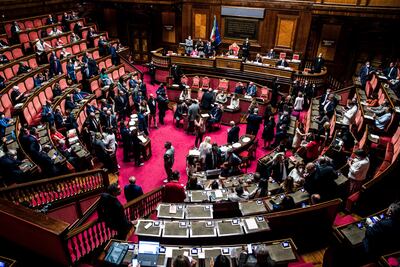Italy might need new elections to tackle a political impasse, government officials said on Friday, after prime minister Mario Draghi tendered his resignation after a coalition mutiny.
President Sergio Mattarella rejected the resignation but the crisis still means days, and potentially weeks, of uncertainty as Mr Draghi’s allies work out how to proceed.
Mr Draghi was asked to address parliament next week with a clearer picture of if the political crisis — a falling out with coalition ally the 5-Star Movement — can be resolved.
On the immediate horizon are behind-the-scenes consultations to see if Mr Draghi still commands enough support to govern — which the Italian president wants. If no, then an election could be held as early as September.
“If Draghi falls, we vote,” Foreign Minister Luigi Di Maio said. “An early election … is a problem for the country,” he said.
He said that without a fully functioning government in the coming months, Italy would risk losing billions of euros in European Union post-pandemic recovery funds and not be able to enact measures to combat the high energy costs.

Mr Draghi's 18-month-old government was thrown into turmoil when the populist 5-Star Movement boycotted a parliamentary confidence motion on Thursday over his plans to tackle the growing cost of living, arguing they did not go far enough.
Critics say the party, which was torn apart last month, was acting out of self-interest, anxious to raise its profile with voters, after a slump in the opinion polls.
The risks of political chaos has unnerved financial markets with the premium Italy pays over German debt rising to a one-month high on Friday.
A national election is due in the first half of 2023 and bringing the vote forward would not give parties much time to draw up manifestos and prepare their lists of candidates.
If there is an early election, Mr Draghi could stay on as caretaker, but would not be able to draw up 2023 budget or enact reforms demanded by Europe for Covid-19 recovery funds.
“Italy cannot do without Mario Draghi,” said public administration minister Renato Brunetta, a member of the centre-right Forza Italia party.
“We cannot lose the credibility and trust we have gained in Europe and the world in such difficult times.”
Mr Draghi is a widely respected former chief of the European Central Bank and has played a prominent role in the EU's response to Russia's invasion of Ukraine, helping draw up economic sanctions on Moscow and sending weapons to Kyiv.
None of the parties in Italy’s national unity government have called for elections. The one major group that stayed outside the coalition, the far-right Brothers of Italy, embraced the idea at once.
Led by Giorgia Meloni, the Brothers of Italy has seen its support soar during its time in opposition and looks set to emerge as the largest single party in the next parliament.
The 5-Star will probably come under heavy pressure from other coalition partners to back down and allow Mr Draghi’s administration to see out the legislature.
“We now have 5 days to work so that parliament confirms its trust in the Draghi government and Italy emerges as quickly as possible from the dramatic crisis it is currently entering,” said Enrico Letta, head of the centre-left Democratic Party.


